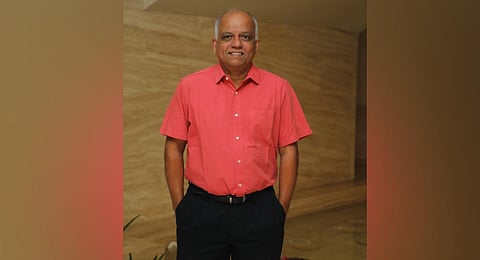

KOCHI: Sam Santhosh, an entrepreneur with a 35-year track record, is often referred to as the 'Genome man of India' after he incubated and launched multiple companies in the life sciences space. Currently, Santhosh, as the biotech advisor for Kerala Development and Innovation Strategy Council (K-DISC), is helping the Kerala government to set up the Kerala Genome Data Centre. Edited excerpts from a telephonic interview
Can you explain the basic idea behind the Kerala Genome Data Centre? What are its main objectives?
The Kerala Genome Data Centre (KGDC) is a high-capacity data center that will enable us to harness the power of genomic data and the rich biodiversity of Kerala. This center would serve as a data hub for researchers, healthcare professionals, and public health officials to access and share genomic data. The data would be generated by sequencing samples from a variety ofsources, including animals, plants, and environmental samples, and would be used to better understand disease transmission, identify new treatments and therapies, and monitor the emergence of new diseases. It would be a critical base for research institutions, hospitals and biotech companies to provide personalized medicine and develop new products, and for bioinformatics and diagnostic startups and software companies to create value-added platforms and tools using AI and Machine Learning. This project is under K-DISC whose objective is to develop it as a Centre of Excellence in Genomics, in line with the Government’s goal of transforming Kerala’s economy into a knowledge economy.
Biotechnology is a high-end and niche area. Do you think Kerala would have the capacity to supply a high number of human resources required in this area, especially given the fact that Kerala is weak in the higher education sector?
Kerala has over 125 life sciences institutions which have been mostly working in silos. We are hoping that KGDC can be the data backbone that will bring all these institutions together. Kerala also has a large number of educational institutions that can create the core human resources needed. Kerala can also attract talent from the rest of India and the world and thus aim to become a knowledge centre for Genomics.
You seem to suggest biotechnology is the next big sector that would trigger a new wave, both in terms of economic growth and job creation. Could you elaborate?
I believe this century is the one for Biology. The revolution in Biology was kickstarted by Genome sequencing and now has the power of editing genes and even creating new genomes (synthetic biology) is triggering a new wave. I call this the ’Biowave’. Gene editing will enable us to cure many diseases permanently. It will also empower us to breed better plants that have a higher yield, more pest resistance, and need lesser fertilizers. Through synthetic biology, we can create microbes that can sequester carbon (reducing global warming), consume plastics, and wastes, and clean up oil spills.
Human genetic sequencing is a tricky issue. Is that also in the works at KGDC?
In fact, human genetic data can give us the most value. However, there are many issues to consider when collecting, storing and sharing human genetic data with regard to privacy, ethics and our rights. So, we will have to carefully consider all this and draw the necessary guidelines to include human genetic data also in KGDC. I hope we will be able to do that in the next 6 to 12 months.
You mentioned how KGDC will help startups to come up in this area. Could you explain?
The valuable genomic data and the powerful Data Centre provides an ideal base for startups to create new products and solutions. Working closely with the Kerala Startup Mission (KSUM) we hope to encourage local entrepreneurs as well as people from across the world to come to Kerala and work with KGDC.
The KGDC is based in Trivandrum. Why Trivandrum?
Trivandrum is an ideal place to locate the Kerala Genome Data Centre due to a number of reasons. a) A team of bio-informaticians is needed to set up and manage the center. The Department of Computational Biology (DCB) based at Kerala University and headed by Dr Achusankar Nair has the resources for this. They were also instrumental in preparing the proposal for the KGDC project. b). The Digital University is the ideal place to host the Data Centre without KGDC incurring any additional costs The Science park which will be coming nearby will provide space for startups and companies moving here. c) Trivandrum has a great ecosystem of life sciences institutions like the Rajiv Gandhi Center of Biotechnology, Sri Chitra
Tirunal Institute for Medical Sciences and Technology, Jawaharlal Nehru Tropical Garden and Research Institute as well as the upcoming Bio 360 Life Sciences park with various organizations inside it.
In an earlier conversation, you mentioned the linkages the Genome Centre will have with other universities like CUSAT, which recently announced a tie-up with Synthite for biotech research.
Genomic Data will be very important to all life sciences institutions inside Kerala and outside. The Centre of Excellence for Synthetic Biology and Biomanufacturing coming up in CUSAT is the first of its kind in India and KGDC will have great synergies with that center. Synthetic biology depends on Genomics sequencing and DNA synthesis and hence KGDC will be able to support them well.